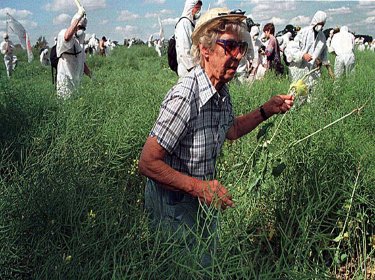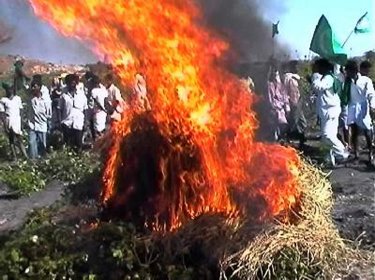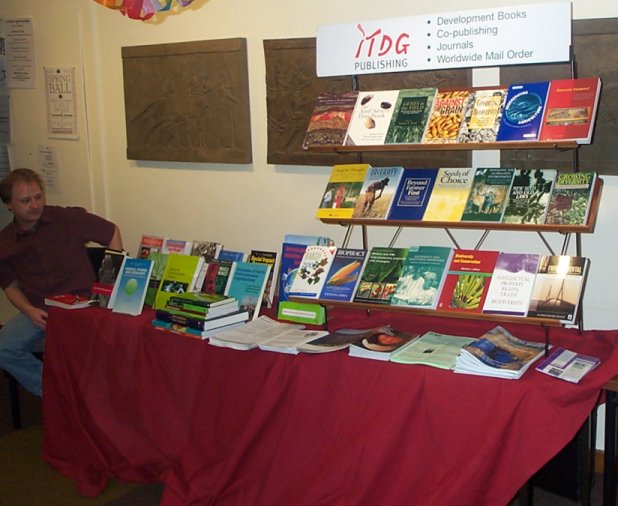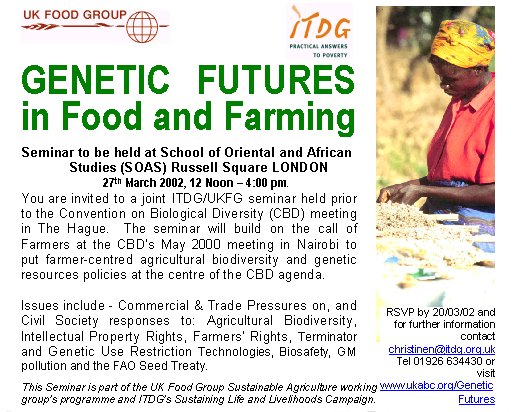Tony Gross - FIELD (Foundation for
International Environmental Law and Development)
Advancing the CBD Agenda
 Tony Gross focussed on the
process of civil society involvement in the CBD and bringing farmers' issues
into the policy process.
The CBD is an intergovernmental legal instrument, with a set
of institutions attached to it, which sets a framework for national activities.
It is a political instrument to deal with the whole range of issues on
biological resources, and not a mechanism for implementation, which is carried
out through other bodies and at national level.
The COP is a forum for political negotiations around
scientifically based recommendations. Countries come to the meeting well
prepared with set positions which have been worked on during intersessional
processes at national level, so the opportunities to influence the outcome of
the COP itself are limited. The COP is thus like the tip of an iceberg: the
national level negotiations preceding the COP predetermine the visible
negotiations. Lobbying can influence the text, but only to a limited extent.
COPVI will be a series of set piece discussions on text:
there are 244 pages tabled, including 15 pages on Agricultural Biodiversity.
Influencing the policy setting agenda on agricultural biodiversity of the CBD
requires consistent effort and involvement. A conscious decision has to be
taken, to get immersed in the issues, and negotiate over details of the text.
The traditional negotiating blocks of developed vs
developing countries, east vs west Europe, are fracturing and new alliances are
forming, which makes the whole negotiating process very complex.
NGOs will have more impact working at the national level,
where policy is developed, and joining forces in multilateral alliances. There
are opportunities for NGOs and civil society stakeholders to submit views and
case studies to committees of the CBD - e.g. inter-sessional bodies on GURTs -
to redress perceived imbalances in CBD positions. When rosters of experts are
established, NGOs can put people forward to serve. Involvement requires an
understanding of the timetabling and process, and knowledge of the personnel in
the Secretariat.

Nico Verhagen - Via Campesina
Realising Farmers' Rights
 The key issue for Via Campesian
is food sovereignty - the right of farmers to build and sustain local food
systems based upon locally available resources. Via Campesina is therefore
against trade liberalisation in agriculture: low price food dumping causes
destitution amongst small farmers. Via Campesina demands market regulation -
the right to apply import controls, opposition to export subsidies and the
right for state support to sustainable farming.
A Charter of Peasant Rights is being drawn up by Via
Campesina - a point of reference for CBD-related activities. They wish to see
radical extensions of Farmers Rights recognised in the COP, FAO and WSSD.
Central to this is biodiversity - a non negotiable right of people. Food
security and agricultural production systems depend on diversity. Whilst gene
banks are an asset, they can never replace farmer based systems. Full rights
for communities to genetic resources are therefore a key issue for Via
Campesina: intellectual property is privatisation
April 17th is designated International Day of Farmers'
Struggle. A major effort is currently underway to build alliances for an
outright ban on GMOs - to get genetic engineering out of food production. A Ban
on GURTs is to be proclaimed. The danger of contamination of Gene banks and of
centres of biodiversity will be highlighted.
Via Campesina is concerned that benefit sharing from, and
access to, genetic resources will become a back door entry for patenting. To
avoid this, there must be concrete steps towards a ban on the privatisation of
genetic resources.

 Alex Wijeratne,
ActionAid
Action Aid's Chip Patent Application
 ActionAid recently ran a high
profile campaign in the UK on patenting of food. Action Aid sought to show the
potential outcomes of patents on common foodstuffs through a tongue-in-cheek
proposed patent on the ready-salted potato chip. This is a highly political
issue and ActionAid seeks to highlight the absurdity and injustice of new
patent rules that allow companies to get exclusive rights over basic foods and
even nature itself, simply by adding something to it or modifying it in a way
that has not been done before. If successful, the patent could give ActionAid
legal rights not only over the ActionAid Chip, but also over any chips that
have salt added to them.
An application was formally made to the UK Patent Office. However, they have
learned that the Patent Office is running a smear campaign on the application,
so that it will not be taken seriously. A campaign run by ActionAid, sent out
to 20,000 UK households inviting them to send back a postcard to their MP,
elicited a return of 7,000 - a huge response for this type of activity,
indicating the strength of public feeling on the issue of food patenting.

Joyce Hambling, GEN
Civil Society Mobilisation
 GEN - a network of over 100
people -- working to raise public awareness about genetic engineering. As a
result of this work, the European public has quite a sophisticated
understanding of the issues of genetic modification to food, and strong
opposition to it. Linked to this is a growing adverse reaction to the perceived
corporate control on food production and supply.

The impact of GEN and other groups' work is seen in the
protests at every GM crop trial in the UK, from peaceful marches and banner
holding, to the uprooting of crops.
Internationally, activism is not limited to middle classes;
in India poor farmers groups have been mobilised on the GM issue, and have
lobbied their government hard. Burning of Bt cotton trials illustrates the
strength of feeling on an issue which farmers believe threatens their
livelihoods.

GEN is joining a programme of activities in the Hague at COP
VI, entitled 'Resistance is fertile', a banner for a large and diverse European
group of civil society organisations. The event will call for radical change in
agriculture and international trade, for reclaiming our genetic resources (free
the seed!), against GMOs and patents on life and against the corporate control
of food and agriculture.
Actions will focus around the International Day of Farmers'
Struggles, April 17th.

Evidence of extensive Civil Society Mobilisation on the
issues around agricultural biodiversity is the proposal for a Treaty of Global
Commons announced at the World Social Forum in Porto Alegre their support for a
treaty which would establish the earth's gene pool as a global commons. The
treaty is the first globally coordinated campaign among biotech activists, and
already has the support of over 250 organisations. Non-Governmental
Organizations (NGO) leaders have said they will challenge government and
corporate claims on patents on life in every country. Activists will be working
with political parties to introduce the Treaty Initiative in parliaments around
the world over the next year. In September 2002, activists will demand that
governmental delegates to the Rio +10 Conference in South Africa endorse the
Treaty to Share the Genetic Commons and make it the centerpiece of future
biodivers ity efforts.
 |







